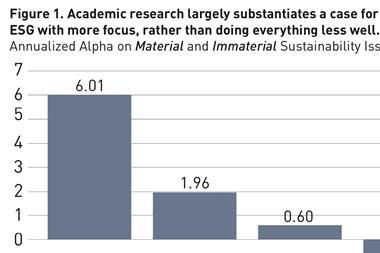The reporting standards that the new International Sustainability Standards Board (ISSB) comes up with need to be able to be combined with other standards that individual countries may wish to require, an official at the Financial Conduct Authority (FCA) told an industry conference today.
Speaking at the UK Sustainable Investment Forum’s (UKSIF) “Ownership Day”, Mark Manning, technical specialist for sustainable finance and stewardship at the regulator, said the FCA thought it “absolutely right” that the ISSB was focussing on reporting standards focussed on enterprise value creation.
“But it’s really important that there is interoperability between the global baseline of enterprise value-oriented standards and any additional jurisdiction-specific standards that might capture the external impact of issuers on the environment and society that are not otherwise captured in that enterprise value-oriented set of standards,” he added.
“So that will be the vehicle for instance for the UK to adopt an ISSB global baseline but then incorporate disclosure requirements on top of that that capture reporting against the green taxonomy, for instance.”
He continued: “I think we’ve got a really good opportunity here globally to set a baseline of enterprise value-oriented standards but with flexibility to layer on top of that, including here in the UK.”
Manning’s comments echo those made by the ISSB’s chief executive officer Emmanuel Faber, who on a webinar last week said there was “too much noise” about the ISSB not adopting a double materiality approach and that this needed to be “shut down” because the ISSB’s approach and an impact-oriented approach were not opposites but “different layers.
2023 AGM season regulatory-convened initiative?
At the UKSIF conference the FCA’s Manning also spoke about the need for “real, genuine” stewardship and options that a cross-regulator, cross-Whitehall group was exploring in this regard.
He was responding to a question about the UK Chancellor’s stated ambition for the UK to become the world’s first “net zero aligned financial centre”, and if this had implications for “the continued participation of high emission intensity issuers in the UK”.
Acknowledging the question as “brilliant and certainly rather contentious”, Manning said it was important to recognise that “we’re on a journey” and that the regulatory framework needed to allow for that.
He said the Stewardship Regulators Group, which included the FCA and the Financial Reporting Council, has been exploring three main questions, namely what information did investors need to be able to effectively hold investee companies to account and what voting mechanisms were available for them to do so.
He also said the group was gathering views on whether there was scope for a regulatory-led or -convened voluntary initiative for the 2023 AGM season to “road test outputs coming out of the Transition Plan Taskforce but more generally road-test ideas, such as Say on Climate, to really provide a structured and rigorous way for stewards to hold their investee companies to account”.
The Transition Plan Taskforce is an initiative of the government in connection with a planned move to require UK financial institutions and publicly listed companies to set out how they will reduce emissions. The Taskforce is to report by the end of 2022 on a “gold standard” for transition plans and associated “cutting edge” metrics.
Manning said the delivery group for the Taskforce was engaging in work to “really put some flesh on the bones” of that targeted gold standard.
Reporting ‘breathing space’ for trustees
Caroline Escott, senior investment manager, active ownership at Railpen, the in-house manager for the £35bn railways pension scheme, said the investor supported routine voting on climate via a shareholder ‘Say on Climate’ as long as investors were supported to be able to “really understand what good looks like”.
She said Railpen had last year “hurriedly pulled together” internal guidance to help it do that and that it had built on it this year as part of its net-zero voting policy “to try to make sure that we are not just ticking things that are alright but really aren’t good enough and really aren’t going to have the real world impacts”.
“The worst thing would be if trustees try to rush through things because they’re worried about external pressure or regulatory pressure or somehow being seen to do the wrong thing”
Caroline Escott, senior investment manager, active ownership at Railpen
Earlier during the panel discussion Escott had said that pension schemes needed “breathing space” to support effective and meaningful climate reporting from them.
Schemes needed to be given the time to take a step back and think about key questions, such as what metrics matter the most and which managers they may need to pressure more.
“The worst thing would be if trustees try to rush through things because they’re worried about external pressure or regulatory pressure or somehow being seen to do the wrong thing,” she said.
She praised the Department for Work and Pensions for requiring trustees to meet certain obligations “as far as they are able” and also said The Pensions Regulator was being pragmatic.
Escott also said there were smaller pension schemes with limited governance resources and, directing this comment to FCA’s Manning, that it “might be quite impactful” if the the regulatory regime for investment consultants included “something explicit around how you ensure that consultants are innovating, including on meaningful support for their clients on climate and stewardship”.
Read the digital edition of IPE’s latest magazine













